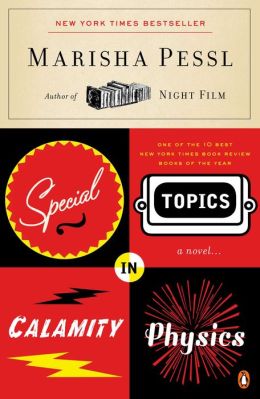Really I am stretched to think how the books I most recently read can be compared; they probably shouldn't be. They have young adult female protagonists, but that's about the extent of shared ground. So suffice it to say that they represent some of the variety of what I consume in a any given time period. The most dazzling by far is Special Topics in Calamity Physics, told from the POV of Blue vanMeer, now a freshman at Harvard, as she briefly recounts her early years in the company of her itinerant and professorial father, and then focuses on her final year in high school. Ordinary mortals like me will occasionally find it tough going to wade through the endless footnotes and citations comparing every person, place and experience to some bug, animal, book or movie. There is a complex mystery to be explored--surrounding the death (murder or suicide?) of the film teacher, Hannah Schneider (or is she?). Blue seems a decent sort in spite of everything and especially in contrast the her school peers who epitomize everything that is wrong with "the younger generation." I would never read this book again and someone would have to really twist my arm to make me read anything else this person subsequently writes--this is Marisha Pessl's first novel. That being said, it is--on occasion--bitingly funny, and brilliantly literate. Other reviewers have been more positive in their regard, for example see the piece in Salon.com.
At the opposite end of the spectrum, there is the totally fluffy (my word for reading that is reasonably entertaining but of little enduring literary value) first novel of Marissa Doyle, Bewitching Season. Our 17-year old protagonists, Persephone and Penelope, are twins and heir to witching talents which are being honed by their governess Melusine Allardyce. Set in early 19th century England, when Victoria is still a princess, they are about to embark on their "coming out" season in London society, which gets really complicated when Ally mysteriously disappears and Persey casts a love spell on the handsome boy next door.
And last but not least off the bookstack this week is How I Saved my Father's Life: And Ruined Everything Else by Ann Hood. The typical YA-type title should alert the reader to the pre-teen POV for the story. Madeline Vandermeer is just barely 11 years old when she accomplishes two miracles: the first is to move a glass of water without touching it and the second is to save her father’s life when he is caught in an avalanche. But now she needs to make a third miracle happen because her father returned to his family only briefly before leaving them for a celebrity life, a new wife, and a baby on the way. Madeline is convinced her mother is to blame for the divorce, because she is so “ordinary,” whereas the new step-mother, is so glamorous. Left in the falling-apart house they can’t afford to remodel, Madeline and her younger brother are weekly subjected to their mother’s culinary experiments which provide the fodder for her food column in Family magazine. Madeline sees her mother’s work as foolish and based on lies, since they are no longer the happy family of her dreams. Worse yet, when her stressed mother takes Madeline out of ballet school in Boston, an hour away, and puts her in a local class, she sees her chances of becoming a world class ballerina slipping away. Then Family magazine offers to send the family on an all-expense-paid trip to Italy so mom can write about the joys of travelling with children. While there, Madeline, initially interested only in visiting reliquaries of various saints, has some perception altering revelations of her own. This is a great book to offer tweens and teens facing divorce and new step-families. The young protagonist exhibits all the wretched feelings and behaviors that accompany such significant losses but comes eventually to a balanced view of parents and the hard choices we all make when life isn’t perfect.

No comments:
Post a Comment